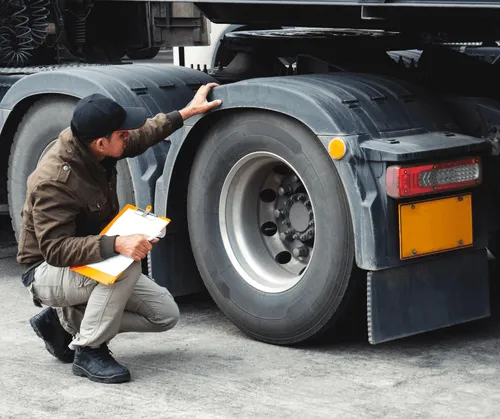
This year's International Roadcheck is upon us and takes place between May 16th and May 18th. This is the most extensive targeted enforcement program on commercial motor vehicles, with nearly 15 trucks or buses inspected on average every minute across North America for 72 hours by the Commercial Vehicle Safety Alliance (CVSA) alongside the U.S. Federal Motor Carrier Safety Administration.
With a focus on anti-lock braking systems (ABS) and proper cargo securement for commercial motor vehicles, operators must prepare accordingly to prevent out-of-service violations. It's important to stay prepared and make efforts to remain compliant. This proactive approach not only improves safety on the roads but also helps businesses like yours avoid costly fines and delays.
The anti-lock braking system is critical in reducing collisions by preventing wheels from locking up or skidding and allowing a driver to maintain control of the vehicle while braking.
Make sure to check for warning lights on cabs and trailers. Plus, even if there is no indication of a problem, have drivers conduct thorough pre-trip inspections of some common problems to ensure that the ABS is functioning properly.
Common causes of ABS errors include:
Improper cargo securement poses a severe risk to drivers and other motorists. It affects the vehicle's maneuverability or causes unsecured loads to fall, resulting in traffic hazards and collisions.
Past International Roadcheck data routinely found cargo securement in the top five of vehicle out-of-service violations. Avoid these potential risks by performing proper inspections and educating drivers.
Cargo securement checklist for drivers:
✓ Ensure cargo is appropriately blocked, braced, tied, chained, etc.
✓ The header board is adequate and secured (if required).
✓ Sideboards and stakes are strong enough, free of damage, and set correctly in place (if equipped).
✓ Canvas or tarp (if required) must be properly secured to prevent tearing, billowing, or blocking of mirrors.
✓ If cargo is oversized, all required signs (flags, lamps, reflectors) must be safely and properly mounted, and all the necessary permits must be in the driver’s possession.
✓ Curbside cargo compartment doors were closed securely, latched/locked, and have the required security seals.
A safety inspection does not have to be stressful for your business. With proper planning, a comprehensive preventative maintenance schedule on your fleet, and following the helpful tips we've covered, you should be all set to pass this year's International Road Check.

As a Renter on the platform, you should account for the International Roadcheck in your logistics. We carefully vet Owners so that all vehicles on COOP should be in good working condition. However, the CVSA could still inspect your rental from May 16th to 18th.
In addition to the above tips, here are a couple of things your driver can do in response to the 2023 International Roadcheck inspection:
We hope your operations go smoothly with passing all checks and inspections to keep the wheels moving quickly and efficiently. By working together and building a well-informed community of commercial vehicle sharers, we can make the roads safer for everyone.